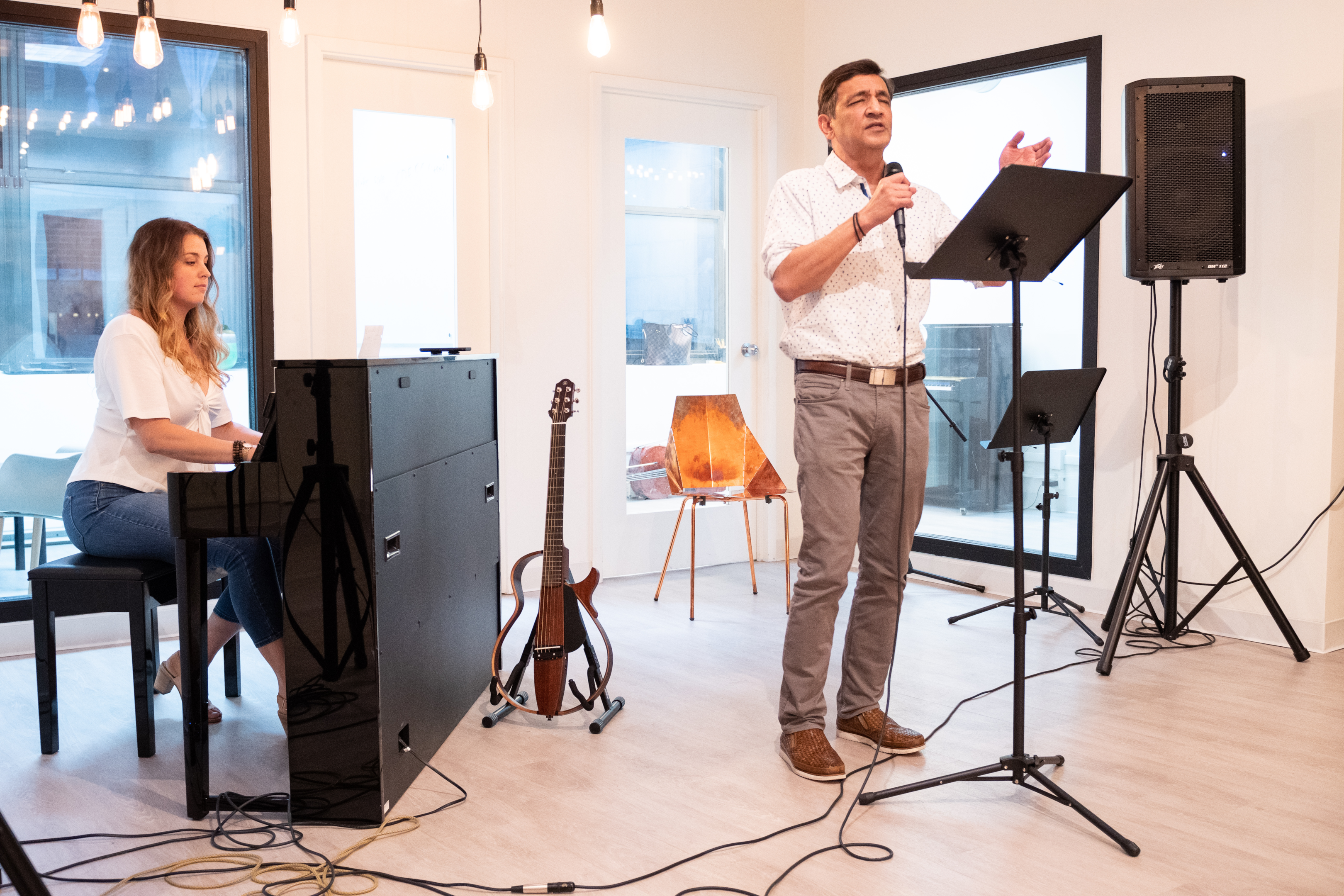Blog
Overcoming Stage Fright: Performance Anxiety Tips

We’ve all been there – racing pulse, tight throat, trembling hands, body shaking, and the overwhelming desire to run and hide. Stage fright, or performance anxiety, is a common experience that can strike at any moment, whether you’re about to do some public speaking, sing a song, or act in a play. For musicians, stage fright is a major obstacle to achieving peak performance – but we’re here to tell you that it doesn’t have to control you or destroy your self-confidence.
In this article, we’ll dive into the psychology of stage fright, explore the factors that contribute to it, and offer strategies to help you conquer your stage fright and perform at your best.
Understanding Stage Fright
Performance anxiety is a natural human response to perceived danger or threat, often stemming from our innate fear of judgment, failure, or social embarrassment. Our fight-or-flight response kicks in, releasing adrenaline and cortisol (the stress hormone) into our bloodstream, which can cause a wide range of physical and psychological symptoms. Researcher Dianna T. Kenny, an expert in the field of music performance anxiety at Oxford University, has found through her study The Psychology of Music Performance Anxiety (2011) that understanding the psychological mechanisms underlying stage fright can help musicians develop coping strategies and improve their performance abilities.
Symptoms of stage fright include increased heart rate, shallow breathing, trembling, nausea, and even memory lapses. While these symptoms are perfectly normal, they can be quite distressing and, if left unchecked, can negatively impact your performance. For musicians (especially singers, who work very hard to eliminate unnecessary muscle tension that negatively affects their sound), these physical symptoms inhibit their performance ability. Studies have shown that the severity of these symptoms can vary greatly among individuals and may be influenced by factors such as personality, experience, and the specific performance context.
Factors Contributing to Stage Fright
Several factors can contribute to stage fright, including lack of experience, low self-esteem, high expectations, or a previous negative experience (Kenny, 2011). Identifying your specific triggers can help you develop personalized strategies to overcome performance anxiety. Research suggests that musicians who understand the causes of their stage fright and actively work to address them tend to experience less severe symptoms and perform at a higher level.

Strategies to Overcome Stage Fright
To further understand and overcome stage fright, musicians can consider the following research-backed suggestions:
Knowing the Music:
Memorize Your Piece
Memorizing your music is the first step toward a successful performance. According to performance psychology researchers Clark and Williamon (2011), thorough memorization leads to a deeper understanding of the piece, allowing musicians to focus on their emotions and stage presence during the performance. As a result, musicians can concentrate on delivering an engaging and captivating experience for their audience.
We suggest using the “thirds method”: commit your piece to memory so that during your performance you can dedicate only one third of your energy towards “what comes next?”, and focus the remaining two thirds of your energy on the experience of performing: making eye contact with your audience, moving with a clear intention, and having fun on stage.
There are many effective methods to memorize a piece of music: you can break it into small chunks and memorize one at a time, you can repeat and rehearse the piece at least 20-30 times, and research shows that starting out with focused, frequent practice sessions and gradually increasing the intervals between help makes for better retention of the piece over time.
Practice As If It’s The Real Thing
Practicing as if it’s a real performance is essential for building confidence on stage. Research indicates that simulating the conditions of a live performance during practice, such as dressing in performance attire and using a microphone, helps musicians feel calmer on stage and eliminates nervousness (Clark & Williamon, 2011). This is because the brain turns it into muscle memory – you’ve done it before, so you’re less nervous about it! A familiar environment will allow you to fully concentrate on your performance, so it’s a great tool for managing stage fright.
Of course, it doesn’t have to go as far as dressing in your performance attire, but the way you sing the song in your lesson is usually the way you perform it too – when we’re under stress, we tend to revert to what we are used to.
Continue Through Mistakes
No performance is perfect – making mistakes is inevitable. Continuing through mishaps is a crucial skill for musicians, as errors are inevitable during live performances. Learning to recover from our mistakes by calmly moving on to the next note or phrase will help you maintain your focus and poise during a performance. This resilience is invaluable for overcoming stage fright and self doubt – because no matter what happens, you know you got it!
We often practice our piece so many times we get used to how we know it’s supposed to sound, but we forget that the audience has never heard the song before, and they will never know that you played a wrong note if you don’t show it in your face or body. If you are feeling confident, your performance will seem flawless.
Try playing all the way through the song without stopping at least 4 times. If you make a mistake, you know you’ll have another try to get it right! And if a mistake was to happen during performance, try thinking of a creative, funny, endearing way to address it, so the audience feels you’re “in on it” too!
Creating a Performance Mindset
Conquering stage fright is more about overcoming the mental tricks our brain plays on us than about being the best musician. here are a few evidence-based strategies to help you overcome your fear and tame your nervous energy:
Utilize Relaxation Techniques
Relaxation techniques, such as deep breathing, progressive muscle relaxation, or meditation, can help musicians calm their nerves before a performance. Research by Clark and Williamon (2011) found that incorporating relaxation methods into pre-performance routines significantly reduced performance anxiety among musicians. By starting each performance in a calm state, musicians can better overcome stage fright.
That being said, we often forget that consistency is key for these techniques to work – if your routine doesn’t usually involve a relaxation exercise, a pep talk or other meditative techniques, the advice of “just meditate!” may actually be a source of more anxiety. We do however encourage you to try and incorporate relaxation techniques into your pre-show rituals – especially if you regularly feel nervous – not only do they have a positive effect on your mental health, but they have been proven to be helpful with anxiety management.
Try the Checklist Technique
Creating a checklist of specific actions or thoughts that help you focus and perform at your best is a valuable tool for managing stage fright. The tasks can be as simple as “take a deep breath”, and as complex as “imagine your success”. The aim is to break down this seemingly complex endeavor into smaller, manageable chunks that give you a sense of accomplishment as you cross them off the list.
Reviewing this list before each performance can reinforce your confidence and minimize anxiety (Clark & Williamon, 2011). This personalized checklist can serve as a central focal point, allowing musicians to maintain focus and control over their performance, and to distract them from any uneasy feeling they may experience.
Keep an Improvisational Mindset – Recovering from Blunders
Anything can happen during a live performance – and this is often a main fear for most people looking to perform. Developing an improvisational mindset can help you embrace the unpredictability of live performances. Practice improvisation in various situations and you’ll be feeling more confident when recovering from a slight mishap, and gain experience adapting to unexpected changes on stage. Cultivating this mindset will empower you to handle performance challenges with ease – with time, the audience won’t even notice the error at all!
Set Goals That Matter
Sometimes, we tend to focus on achieving specific outcomes, and this often brings up mixed feelings for us. Let’s reframe that in a more positive way: try setting goals that emphasize personal enjoyment and growth instead! imagine the fun you’ll have on stage, and focus on the feeling of performing, rather than on how you sound.
Tim Ferriss, author of Tribe of Mentors (2017), suggests that shifting your perspective from the outcome to the process can foster a more positive attitude toward your performances and provide anxiety relief. This approach will help musicians focus on the joy of making music, reducing the pressure associated with stage fright and keeping your intrusive thoughts and fears at bay.
Fear Setting (Tim Ferriss)
Speaking of fears, Tim Ferriss’ Fear Setting exercise encourages musicians to confront their fears related to performing. In his book Tribe of Mentors, Ferriss explains that by listing your fears, assessing the potential consequences, and developing strategies to mitigate those consequences, you can gain a sense of control over your nerves. This exercise can better prepare musicians for their performances and help them manage their anxiety. This doesn’t only work for musical performances either – you can use this technique to manage social anxiety or a public speaking anxiety too.

Perform as Practice
We talked about practicing as if it’s the real thing as a useful tool to handle performance anxiety, but let’s flip that on its head – why not treat the performance itself as practice?
Find Opportunities to Play for Others
Seeking out performance opportunities, such as open mics or jamming with friends, provides musicians with the chance to perform in front of a small, supportive audience. If you feel anxious about getting up in front of a group, this can really help with anxiety, as your body gets used to the experience and is less nervous about it. That’s why we have Happy Hours at Musicians Playground: it’s a low-pressure event that gives you an opportunity to practice your performance skills and build confidence on stage in front of an audience that has your back!
Create Opportunities to Play for Others
If you can’t find a performance opportunity that you like, why not organize one yourself? Maybe throw a party with your best friends or put on informal concerts or recitals for friends and family. That’s a great way to overcome anxiety, as these intimate settings provide valuable feedback and support, enabling you to refine your skills in a positive way.
Participate in Group Classes
Group classes are also a good way to gain experience – they enable us to learn and perform with others in a collaborative environment. If you still feel embarrassed about putting yourself out on stage, this is a great interim step you can take. Grab your best friend and take a group class together! Studies show that these settings can help musicians feel confident, overcome nerves, and receive valuable input from their peers and instructors.
Make it a System
When you find what works for your stage fright, make it into a system!
Evaluate Strengths in Other Fields
Think about it – there are areas in your life that your feel very comfortable in – reflect on your strengths and accomplishments in those areas of your life, such as sports, academics, social situations, or public speaking. Identify the strategies or traits that have contributed to your success in these areas. Consider the sources of your confidence in the other aspects of your life and how they might apply to your music performance. For example, you might draw confidence from extensive preparation, a strong support system , or positive feedback from previous performances.
Apply the skills and strategies that have worked for you in other domains to your music performance. For instance, if you’ve excelled in sports by setting realistic goals and staying focused on your objectives, adopt the same approach in your music practice and performance. If you do a lot of public speaking, for instance, the same techniques you use to engage the people you are speaking to can be translated to interacting with your audience for stage performances.
Create a System for Success Based on That
Develop a personalized system that incorporates the strategies and habits you’ve identified as effective in other areas of your life. Consistently applying these techniques can help you overcome your stage fright and enhance your performance abilities.

Break A Leg!
Be it music or public speaking, facing performance anxiety involves a multifaceted approach that includes mastering the music, developing a performance mindset, gaining experience through practice performances, and creating a successful system based on what works for us in other areas of our lives. By implementing these strategies and learning from your experiences, you can conquer your performance anxiety and deliver exceptional performances that showcase your talent and passion for music.
At Musicians Playground, we have facilities in place to help you achieve that: from personalized private lessons, to group glasses, to performance events like Happy Hour – we got your back.
Hopefully, you found this article helpful and have learned some new ways to process your fight or flight response and overcome that anxiety. We post on this blog monthly, so if you liked this article, be sure to subscribe to our mailing list – this way you’ll stay updated on any new content we put out, our upcoming events and studio news. Now, take a deep breath and break a leg!

